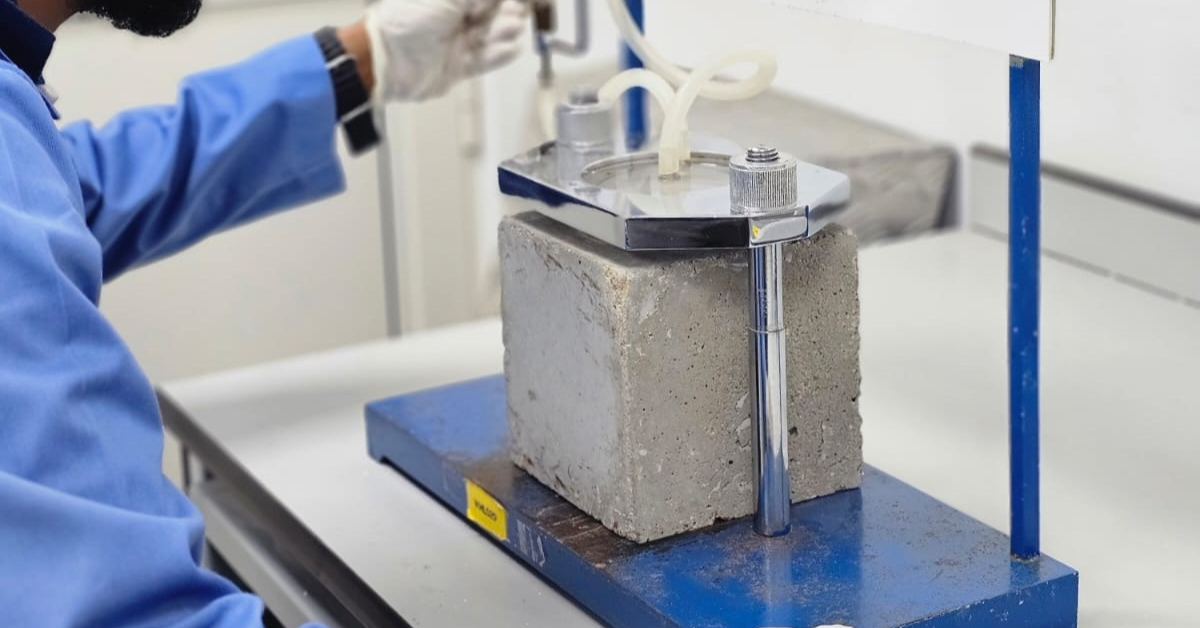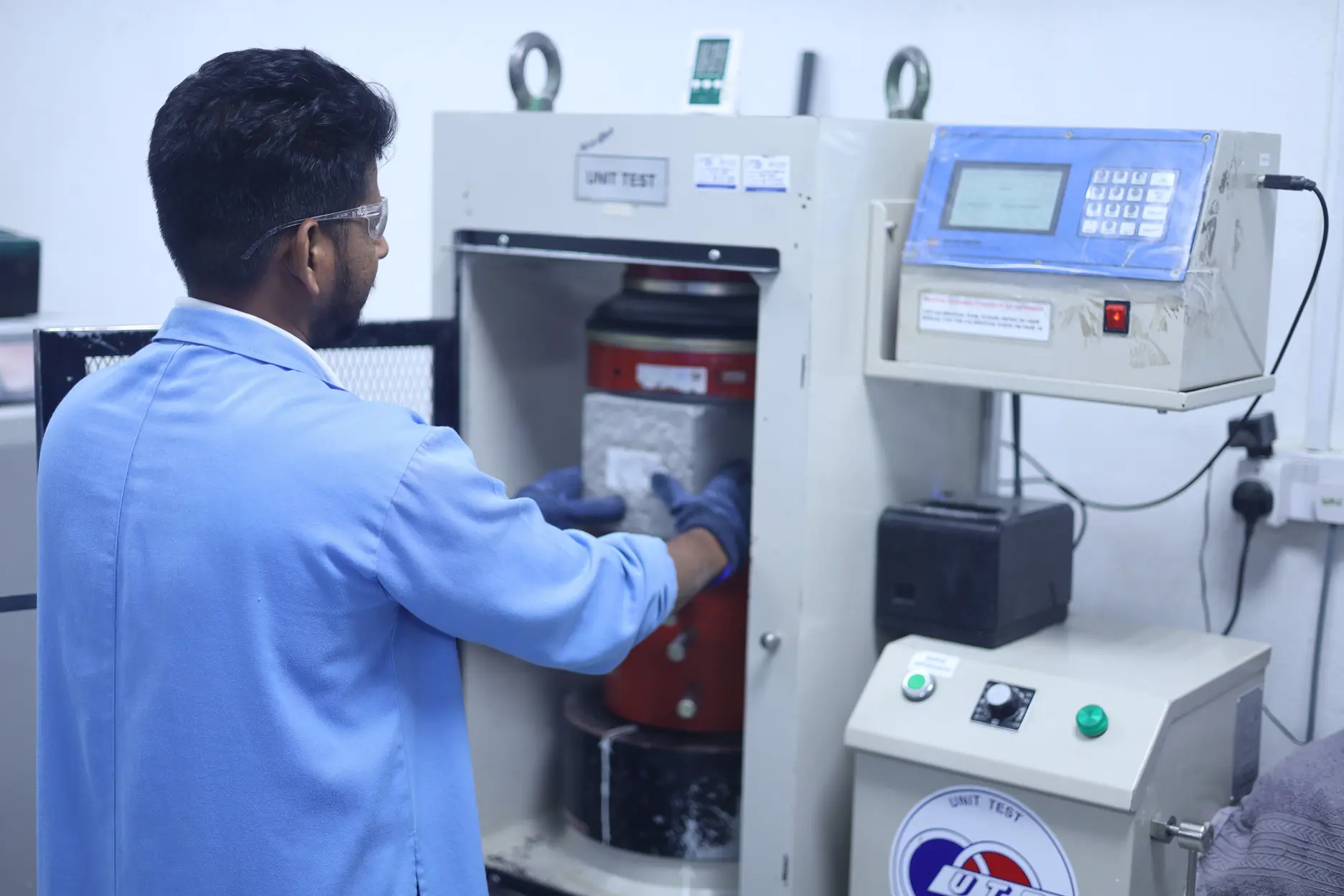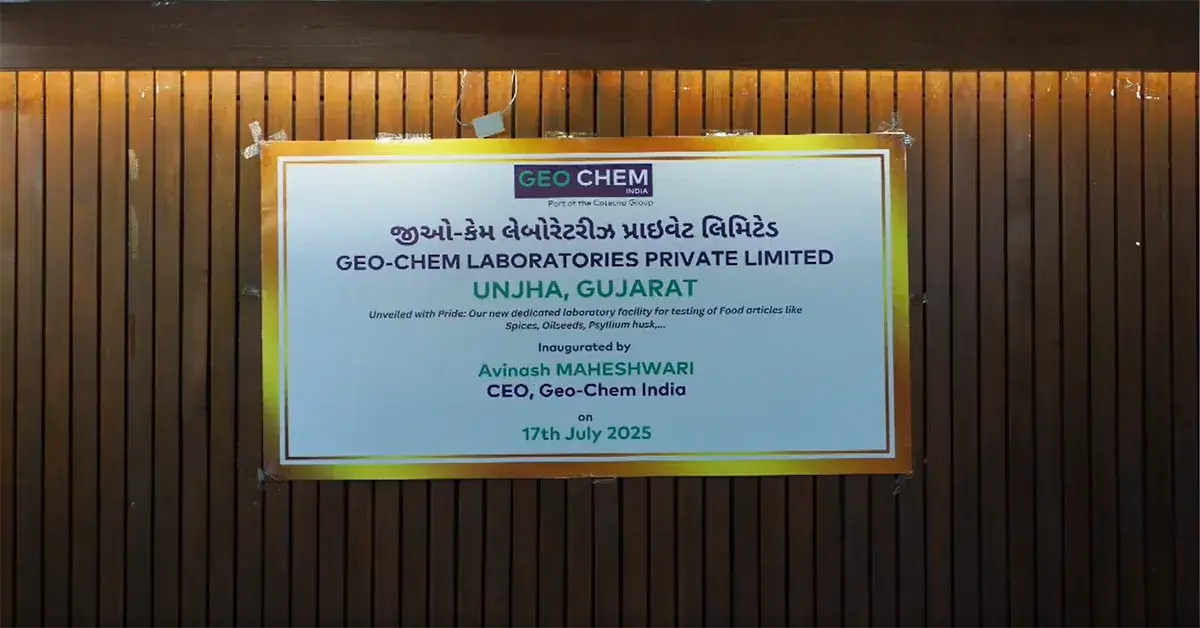How to Determine Concrete Strength Using Material Testing

Concrete is a mixture of broken stones or gravel, sand, cement and water. The mixture is used as a building material either through application or moulding while it’s wet. Its global usage is twice that of steel, wood, plastics and aluminium combined. It is estimated to be the second most used substance in the world after water. The wide usage of concrete in construction makes it critical for the product to meet certain quality and safety standards.
Why is evaluating concrete strength important?
Testing concrete strength can serve various purposes, with the main objective being quality control and ensuring compliance with predetermined specifications. Typically, tests are carried out to either compare the results with specified values or to pinpoint any deviations from predefined standards and targets. These tests can be broadly classified into two categories: mechanical tests that subject materials to destructive forces and non-destructive tests that enable the assessment of materials within an actual structure without causing any damage.
Evaluating the compressive strength of hardened concrete holds great significance in structural design, as the desirable characteristics of concrete are closely linked to its strength. When conducting compressive strength tests on specimens prepared according to standard procedures, which involve thorough compaction and wet curing for a specified duration, the results obtained reflect the potential quality of the concrete.
 Image: Electrical Indication of Concrete’s Ability to Resist Chloride Ion Penetration Astm C 1202 using a RCPT Equipment (Voltmeter, Power Supply and RCPT Cells) Sci-tech
Image: Electrical Indication of Concrete’s Ability to Resist Chloride Ion Penetration Astm C 1202 using a RCPT Equipment (Voltmeter, Power Supply and RCPT Cells) Sci-tech
Concrete Regulatory Requirements
Many regions have rigorous building standards and codes that specify the required quality and strength of concrete for various types of structures. The use of sub-standard concrete can result in legal consequences, penalties, and the potential need for mandatory structural modifications. The primary purpose of these building codes is to safeguard the well-being of end-users of a structure, guaranteeing a safe environment for them. Regional and national building codes, such as the ACI standards, play a fundamental role in shaping the construction industry. They offer assurances of safety, establish quality benchmarks, and consider economic factors to ensure that the built environment is both secure and sustainable.
How Wimpey Laboratory helps clients validate their product quality
Wimpey Laboratories provides all-encompassing testing solutions that cover every facet of concrete testing. Our lab offers clients the convenience of a one-stop testing partner to optimize cost savings. These testing services encompass fresh concrete tests, hardened concrete tests, durability assessments, specialized concrete tests, laboratory mix design verification, extended-term curing, as well as the estimation of concrete strength and durability. Additionally, Wimpey offers in-situ verification of strength and durability. Our concrete testing services are comprehensive, accredited in accordance with ISO 17025:2017 standards, ensuring reliability and quality.
Wimpey's Scope and Capabilities for Concrete Testing
BS EN 12350-Testing fresh concrete
- Part 2- Slump test
- part 5- Flow table test
- part 6- Density test
- Part 7- Air content test (Pressure method)
- ASTM C232- Bleeding
- ASTM C1064- Concrete Temperature
BS EN 12390- Testing Hardened Concrete
- Part 2 - Making and curing specimen for strength test (Cube and Cylinder)
- Part 6- Tensile Splitting Strength
- Part 5- Flexural strength for Concrete beam
- Part 1 - Core Compressive strength.
- ASTM C157 - Drying shrinkage
Paving Blocks
- BS 6717-1 Compressive Strength
- ASTM C293, ASTM C78 - Flexural Strength
- ASTM C140- Water Absorption
- ASTM C418 , BS EN 1338- Abrasion Resistance
Kerbstone
- BS EN 1340: Annex.E - Water Absorption
- BS EN 1340: Annex.F - Bending Strength
- BS EN 1340: Annex.I - Unpolished Slip Resistance Value
- BS EN 1340: Annex.G - Wide Wheel Abrasion Resistance
Durability test
- BS EN 12390 Part 8 - Depth of penetration of water under pressure
- BS 1881 part 208 - Initial surface absorption
- BS 1881 part 122- Water Absorption
- ASTM C1202 - Rapid chloride ion permeability
NDT test
- BS EN 12504 part 2 - Rebound Hammer
- BS EN 12504 part 4 - Ultrasonic pulse velocity test
- BS 1881 part 204 - Scanning for concrete
- ASTM C 876 - Half Cell Potential
- BS 1881 Part 203 - Crack Depth and Width
- BS EN 14630 - Carbonation Depth in Hardened Concrete
Chemical Analysis
- BS 1881- 124 Acid-soluble Chloride content
- BS 1881:124 Acid-soluble Sulphate content
What sets us apart?
At Wimpey, we strictly adhere to international test procedures and methods through a technically proficient approach. We ensure the attainment of precise and highly accurate test results, instilling confidence in our clients. Wimpey's commitment to timeliness guarantees that clients receive results as promised, contributing to project adherence and potentially substantial cost savings. The technical complexity of concrete testing may lead to client inquiries or the need for clarifications. Our responsive customer service team ensures that clients obtain the necessary information promptly.
 Image: Compressive Strength Bs1881-116/ BSEN 12390-2 using a Unitest / Matest
Image: Compressive Strength Bs1881-116/ BSEN 12390-2 using a Unitest / Matest
Wimpey is dedicated to fostering long-term partnerships by delivering reports on schedule and ensuring that clients have a clear understanding of the results provided. With a focus on innovative testing methodologies, Wimpey consistently anticipates industry changes, ensuring that clients continually receive cutting-edge services.
Wimpey doesn't merely function as a service provider; we operate as a partner, placing a strong emphasis on collaboration and mutual respect for the success of each project. We believe in organizing seminars and training sessions with live demonstrations to educate stakeholders about the significance of testing procedures and the importance of adhering to them rigorously to attain precise and reliable results. One of our clients, Arabian Coast, gave us a five-star review and the following feedback, "We are grateful for the ongoing support from Wimpey. Your commitment has helped a lot in our progress on various projects and we look forward to your continued support in the future.”
To learn more about material testing to determine concrete strength or other Wimpey services, please contact us.
Latest News

24.07.2025
Geo-Chem Launches New Food Testing Lab in Unjha, Gujarat, India
Geo-Chem India expanded its scope of work in Gujarat with the launch of a new food testing laboratory.

08.04.2025
Innovation and Precision: How Complex Diagnostics Are Transforming Plant Health in the Field
Harnessing Technology for Smarter, More Sustainable Crop Protection.

